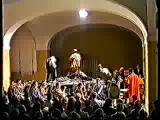Der Kaiser von Atlantis
| Der Kaiser von Atlantis | |
|---|---|
| Opera by Viktor Ullmann | |

A scene from the first performance at Terezin, where the opera was composed in the concentration camp in 1934, performed on 23 May 1995
|
|
| Description | "legend in four scenes" |
| Translation | The Emperor of Atlantis |
| Librettist | Peter Kien |
| Language | German |
| Based on | Die Kluge Bauerntochter (The Peasant's Wise Daughter) from the Grimm's Fairy Tales |
| Premiere | 16 December 1975 De Nederlandse Opera, Amsterdam |
Der Kaiser von Atlantis oder Die Tod-Verweigerung (The Emperor of Atlantis or The Disobedience of Death) is a one-act opera by Viktor Ullmann with a libretto by Peter Kien. They collaborated on the work while interned in the Nazi concentration camp of Theresienstadt (Terezín) around 1943. The Nazis did not allow it to be performed there.
The world premiere, presented by the Netherlands Opera at the Bellevue Centre, Amsterdam, took place on 16 December 1975. It was conducted by Kerry Woodward using the first performing edition, which he had been actively involved in preparing.
The title is sometimes given as Der Kaiser von Atlantis, oder Der Tod dankt ab, that is, The Emperor of Atlantis, or Death Abdicates, and described as a "legend in four scenes" rather than an opera.
About 1943, Ullmann and Kien were inmates at the Nazi concentration camp of Theresienstadt (Terezín) when they collaborated on the opera. It was rehearsed at Theresienstadt in March 1944, but the Nazi authorities interpreted the work's depiction of the character of the Kaiser as a satire on Adolf Hitler and did not allow it to be performed. Both the composer and the librettist died in the Auschwitz concentration camp.
Ullmann entrusted his manuscripts to a fellow-prisoner, Dr. Emil Utitz, a former Professor of Philosophy at the German University in Prague, who served as the camp's librarian. Utitz survived the camp and passed the manuscripts on to another survivor, Dr. Hans Gunther Adler, a friend of Ullmann's, some of whose poems Ullmann had set to music. The score was a working version with edits, substitutions, and alternatives made in the course of rehearsals. Dr. Adler deposited the original manuscripts and two copies of the libretto in his possession at the Goetheanum in Dornach, the center for the anthroposophical movement with which Ullmann was associated. The manuscripts subsequently passed to the Paul Sacher Stiftung in Basle.
...
Wikipedia
